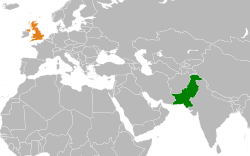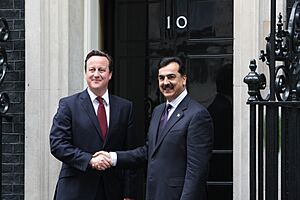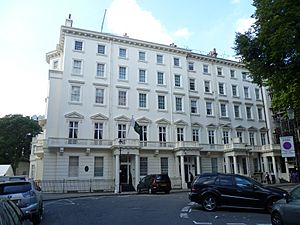Pakistan–United Kingdom relations facts for kids
 |
|
Pakistan |
United Kingdom |
|---|---|
| Diplomatic Mission | |
| High Commission of Pakistan, London | British High Commission, Islamabad |

Pakistan–United Kingdom relations are the friendly connections between Pakistan and the United Kingdom. Both countries are part of the Commonwealth of Nations. Many people of Pakistani heritage also live in the United Kingdom. This makes the two nations very close.
Contents
A Look Back: History
Pakistan used to be part of the British Empire. It became an independent country in 1947. This happened after the Partition of India. Pakistan was a federal Dominion until 1956. Then it became a fully independent republic.
Pakistan left the Commonwealth of Nations in 1972. This was a protest about Bangladesh becoming independent. But Pakistan rejoined the Commonwealth in 1989.
In 2018, Pakistan and the UK signed an agreement. It allows prisoners from one country to serve their sentences in their home country. This helps people be closer to their families.
Talking Together: Diplomatic Relations
Both the United Kingdom and Pakistan have special representatives. They are called High Commissioners. These people act like ambassadors. They work to keep the two countries connected.
Currently, Jane Marriott is the UK's High Commissioner in Pakistan. Mohammad Nafees Zakaria is Pakistan's High Commissioner in the UK. They help manage the relationship between the two nations.
Working Together: Economic Relations
Since 1988, there has been a special tax agreement. This agreement helps prevent people or businesses from being taxed twice. It means they do not pay taxes on the same money in both countries. It also helps stop people from avoiding taxes.
In 2012, the leaders of both countries started a plan. It is called the Trade and Investment Roadmap. This plan aims to increase trade between Pakistan and the UK. More trade means more goods and services are exchanged. This helps both economies grow.
A group called the Pakistan–Britain Advisory Council was set up in 2002. Its job is to find ways for the two governments to help trade. It also looks at how to improve business connections.
Staying Safe: Military Relations
Both nations were once part of an alliance. It was called the Central Treaty Organization. This group was important during the Cold War. The UK saw it as a way to stop the spread of Soviet influence. Pakistan joined hoping for economic help from Western countries.
Pakistan's intelligence agency works closely with UK intelligence services. Both governments regularly meet to discuss national security. They also talk about how to fight against groups that threaten peace.
Since 2015, the Pakistan Army has sent officers to the Royal Military Academy Sandhurst. They also send people to the Defence Academy of the United Kingdom. This shows strong military cooperation. The British Army sees Pakistani forces as important. They help keep peace in the region. They also encourage talks between Pakistan and India on important issues.
See also
- British Pakistanis
- High Commission of Pakistan, London
- Inter-Services Intelligence activities in the United Kingdom
 | Laphonza Butler |
 | Daisy Bates |
 | Elizabeth Piper Ensley |


